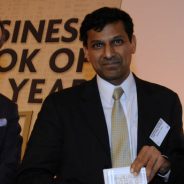Search results for :
Former Reserve Bank of India Governor Raghuram Rajan Returns to Booth
Welcome back to Chicago, Raghuram Rajan. Following a three year stint as India’s top central banker, he returned to the University of Chicago Booth School of Business as the Katherine Dusak Miller Distinguished Service Professor of Finance. Continue reading…
Admissions Tip: Interview Etiquette
As interview invites continue to roll out, and candidates prepare for their interviews, we wanted to continue our theme of providing interview etiquette and advice and share a few very basic pointers on MBA interview etiquette. Though the content of your application materials and comments during the interview are of paramount importance, it’s also crucial to put one’s best foot forward and make a positive initial impression.
Here are a few guidelines for interviewing applicants to keep in mind:
Be Early

Plan to arrive at least 15 minutes ahead of your interview. This will help remove the stress you will experience if you think you might arrive a little late. It will also help the interviewer, who may have back-to-back interviews, and cannot afford any delays in her schedule.
Dress The Part
Unless meeting with an alum who explicitly specifies a more casual dress code, assume that business attire is appropriate. We recommend that applicants dress conservatively, opting for a dark suit (pants or skirts are both fine for women) and a blue or white shirt. Steer clear of flashy brand gear and loud ties, and go easy on makeup and fragrances; you want to be remembered for what you say and who you are, not what you wore.
For those who do not work in an environment where professional dress is worn on a regular basis, you might want to get comfortable wearing your interview attire prior to your interviews.
Be Pleasant

This likely goes without saying, but we wanted to state for the record that in addition to fostering a friendly discussion with your interviewer, it’s also important to be polite to administrative staff and anyone else you might encounter while on campus or in your alumni interviewer’s office. Flippant comments to the administrative assistant at the front desk often find their way up the chain of command.
Be Aware Of Body Language

In addition to your comments about your experiences, interests and reasons for seeking an MBA, your interviewer will also be taking note of the way you present yourself. You’ll also want to avoid taking notes or reading from your résumé; it can be fine to have the latter in front of you as a reference, but remember that you should be familiar enough with its content to focus on maintaining eye contact and establishing a rapport.
Bring Your Résumé

It is always best to have an extra copy of your résumé with you, in case your interviewer needs it. The only exception to this case is when you interview with the University of Virginia’s Darden School, which is the only school that conducts interviews in a truly blind fashion. But even in that case, you may prefer to have a copy for yourself as you interview – though we caution against using the résumé as a crutch or a prop to the point of distraction, as successful candidates typically can speak to their résumé without needing to refer to it much.
Follow Up

Make sure that you get your interviewer’s card and take his or her contact information in order to send a “thank you” email within 24 hours of the interview. This is not only common courtesy but could also serve as the first step in forging a lasting correspondence.
We hope these six suggestions on etiquette help you prepare for your interviews. Meanwhile, applicants who are curious about what to expect might want to check out the Clear Admit MBA Interview Archive, which features firsthand accounts of interviews at all of the top programs, and the Clear Admit Interview Guides, which offer in-depth, school-specific interview guidance for nearly every leading MBA program.
Good luck to everyone hoping for an MBA interview invite!
This article has been republished with permissions from Clear Admit.
How To Become An Accountant With An MBA
When it comes to stable career tracks, there are few more surefire bets than keeping the long arm of the Internal Revenue Service at bay, particularly if you’re the hyper-punctual, law-abiding, number-crunching type. If so, the role of accountant may be just right for you.
One Albers MBA’s Journey From China To Seattle
What happens when you begin an MBA program? You grow, you change and you learn. For many, it’s an evolutionary journey that changes your entire life, and that’s exactly what happened to Yan Tang, an MBA student at Seattle University’s Albers School of Business and Economics. Continue reading…
Dual MBA Degrees at NYU Stern
Should you earn your MBA or your JD? Each has its pros and cons and can set you up in different ways, so which is better? Instead of choosing, why not get both? That’s exactly what you can do at the NYU Stern School of Business through the school’s dual-degree programs.
A dual degree means that you’ll graduate with both degrees on your diploma without doubling the cost and time commitment of graduate school. The Stern School offers a variety of degree paths, time periods and reasons to earn a dual degree; all you have to do is decide which option works best for you.
To help you make the best decision for your career and your graduate school experience, we’ve outlined the eight NYU Stern dual MBA degrees.
Continue reading…
Sloan Lecturer Talks Sports Analytics, Success, Data and Gut Instincts
MIT Sloan School of Management recently debuted a story by Brian Eastwood about how sports analytics are transforming the way many franchises “make critical personnel and business decisions” within their organizations.
What Do You Need To Know When It Comes To Group MBA Interviews?
The goalposts for group MBA interviews are constantly shifting. For years, we at MetroMBA and Clear Admit, as well as other provincial publications, have been dishing out valuable advice for how to prepare for it. And for those familiar, one of the key points to remember is constantly being familiar with the changes.
Hot MBA Jobs: International Business Consultant
International business consulting is one of the world’s fastest growing industries. According to the U.S. Bureau of Labor Statistics, the hiring rate of management consulting (the overarching job category) is increasing much faster than average, with an expected rate improving around 14 percent until 2024.
And there’s no doubt that the international side is growing even more quickly due to the globalization of the world economy, the emergence of new markets and explosive economic growth in countries such as India and China. Not to mention the fact that the world is smaller than ever and that almost every business across the world conducts business internationally—even many small and medium-sized companies. So, as more and more companies embrace the global mindset, international business consultants will be more valuable than ever.
As for MBAs, consulting is still one of the most sought-after career fields. According to the 2015 Prospective Student Survey conducted by the Graduate Management Admissions Council (GMAC), consulting topped the list of intended industries for both millennial and Gen X respondents (41 percent and 27 percent respectively).
But before you make the decision to become an international business consultant, let’s take a look at what your career would look like. Continue reading…
A Look Inside McCombs Latest MBA Employment Report
Many students pursue an MBA with one goal—to improve their career opportunities. Whether you’re leveraging an MBA to transition into a different industry or to move up within your current company, it’s important to get a return on your academic investment. So, how do you know if a particular MBA program is going to advance your progress toward your career goals? Reviewing a school’s MBA employment report is one of the best ways to assess a school’s potential to get you where you want to be.
Every year, MBA programs carefully track where their graduates head after earning their MBAs. These stats, which include salary details, top hiring firms and popular industries and job functions, provide a detailed overview of the job outcomes of their most recent MBA graduates. If reviewed carefully, these reports can give you a good sense of how well a particular MBA program will be in helping you land your dream job.
Recently, the McCombs School of Business released its 2016 Full-Time MBA Employment Statistics. We spoke to Stacey Rudnick, the Director of MBA Career Management at McCombs, to get her perspective on which statistics are most important for prospective students to consider and what trends stood out this past year. Continue reading…
Top 5 MBA Interview Questions
Interviews, interviews, interviews … it’s all anyone seems to be talking about these days, and with good reason. Harvard Business School, Michigan Ross and Chicago Booth have already sent out their Round 1 interview invitations. Stanford GSB starts rolling out invites this week and UPenn/Wharton is also scheduled to release all its invites this week.
Instead of driving yourself crazy with worry, why not buckle down and perfect your answers to the questions you are most likely to be asked? To help you prepare, we’ve scoured the Clear Admit Interview Guides and Interview Archive to compile our very own Top Five MBA Interview Questions list of the questions that most often make their way into MBA admissions interviews at leading schools.
While these refer primarily to questions asked as part of blind interviews, they can certainly also come up as part of non-blind interviews. In those cases, you’ll want to be prepared to go deeper into some of the specific experiences you shared in your application (check out Clear Admit’s quick refresher on the difference between blind and non-blind interviews).
For detailed insights into each school’s interview process, the questions they ask, and how to tackle those questions, access Clear Admit’s Interview Guides.
Top Five MBA Interview Questions
Walk me through your résumé.
The real trick with answering this open-ended question is to gauge how much detail is too much. Imposing a structure can help. “It’s best to err on the side of brevity,” says Alex Brown, who asked this very question of many hopeful Wharton applicants during his time working in admissions at the Philadelphia school. “Think of this résumé walk-through as simply laying the groundwork for deeper discussion of your background and accomplishments.” A good idea is to develop a two- to three-minute run-through, beginning with where you grew up and went to college, what you studied and perhaps something you enjoy outside of work. Then move into a concise overview of your work experience, beginning with your first job and continuing to present day, making sure to explain why you made the choices you did and what you learned in each major role. “This kind of high-level overview gives your interviewer the perfect opportunity to ask for more detail about specific points if she wants it,” Brown says. If you have a gap of three or more months due to unemployment or some other cause, you should be prepared to address it, Brown warns, although in a short résumé question as part of the interview, it may not come up.
What are your career goals?
With any luck, you will already have a well-honed response to this question, developed and refined as part of the process of writing your application essays. “If you are looking to shift industry or function, this is your chance to explain your reasoning and that you have carefully thought through what may be involved in successfully making the transition,” Brown says. Keep in mind why the adcom is asking this question, Brown suggests. “They want to know how focused you are on the MBA and whether you are in a position to take advantage of the resources business school offers or at risk of getting overwhelmed,” he says. Present a very clear post-MBA goal, Brown recommends. “Schools prefer to admit students who can explain exactly what kind of job they want to pursue beyond graduation and articulate how it will set them up to obtain their long-term career objectives,” he says. Schools are also looking, with this question, to see if your goals make sense and are feasible in light of your past experiences; are you able to articulate a clear path and plan?
Why X school?
Here, schools want to see if you have really done your research on their program and whether you are a good fit with their culture. So, do your research. “I recommend a three-pronged approach to make a truly compelling case for your interest in a given school,” Brown says. Start with academics, he says, naming specific courses and professors that you are interested in. “Remember, your interviewer wants to see that you have really researched the school.” Second, mention specific clubs, conferences and other special programs that will help position you for your career goals. “Even better, show how you would contribute to the school community, such as by organizing an event to share specific knowledge you bring with your future classmates,” Brown suggests. Third, show that you have a good understanding of the school’s community, culture, class size and location and have thought about how these fit with your personality, goals and background. “If you have visited campus or talked with current students or alumni—definitely say so, lead with this.” Brown stresses. “Beyond showing that you’ve invested time in getting to know the school, this also helps your interviewer have a mental picture of you on campus.” he says.
Give us an example of a time you took a leadership role.
The way interviewers ask this question can vary—sometimes you’ll be asked directly about your most notable leadership experience and other times you’ll be invited to describe your general leadership style. “It’s important to keep a few basic principles about leadership in mind,” Brown says. “A leader is someone who has a strong vision or point of view and is able to see things others are not,” he continues. A leader must also have excellent communication skills. Choose an example that demonstrates these points. An ideal leadership example will describe a time when you negotiated with and persuaded key stakeholders, such as clients or a supervisor, to buy into your vision and then delegated the work and managed colleagues or juniors. “If you encountered obstacles along the way, share how you dealt with them,” Brown says. “If possible, you should also show success through quantified results,” he adds. As important as a successful outcome is demonstrating how you drew on the help of others where necessary. “No one is successful on their own,” Brown says. Show that you understand that strong leadership means teamwork and playing well with others, he says.
Tell us about a time you failed.
As tempting as it may be to say that you’ve never failed at anything…that is not what that adcom is looking for here. “In fact, this is a favorite question for those who appear to be ‘rock stars’ on paper,” Brown says. But rock stars make mistakes, and having an example in your back pocket of a time things did not go according to plan can show humility as well as your capacity to learn and grow. “The best answer to this type of question ends with a more recent experience where you took the lesson you learned from the failure and put it into play, affecting a better outcome.” he says.
These five questions certainly don’t cover everything your interviewer is likely to ask you, but they do touch upon some of the things you’re most likely to be called upon to share as part of your MBA admissions interview. You can take some of the anxiety out of the interview process by giving each one some thought, drawing on some relevant experiences from your past, and practicing the responses you would give. Don’t practice too much so that you appear overly rehearsed—since it’s important to seem both authentic and genuine—but prepare enough so that you’ll be ready to truly put your best self forward.
This article has been republished with permissions from Clear Admit.
The Top Consulting And Strategic Management Chicago MBA Programs
While industries such as investment banking may be attracting fewer MBAs, that’s not the case for consulting. Year-after-year it continues to be the top draw for MBA graduates. The 2015 Prospective Student Survey conducted by the Graduate Management Admissions Council (GMAC) revealed that a job in consulting services or management consulting upon graduation topped the list for both millennial (41 percent) and Gen X (27 percent) respondents. Continue reading…
Becoming A Product Marketing Manager
Not long ago, MetroMBA looked into the growing popularity of the position of Product Manager for new MBA graduates. We also noted a growth in programs at business schools throughout the country focused on developing the necessary skills for securing a position in product management.
Rotman Launches Canadian Graduate Women in Management Conference
On February 1, 2017, for the first time, graduate business students and industry leaders from across Canada will have a chance to come together and discuss the most pressing matters facing the business community. The annual event, titled the Canadian Graduate Women in Management Conference, was organized by the Rotman Women in Management Association (WIMA) and will be hosted by the Rotman School of Management at the University of Toronto.
The theme of the inaugural year is “Men as Allies and the Parity Proposition,” which will highlight the role of gender inclusivity in expanding the discourse on gender equity. Attendees can expect to hear from a variety of speakers including Bruce Simpson, Director (Senior Partner) at McKinsey & Company, as well as Jennifer Reynolds, Head of Women in Capital Markets.
To get more insight, we spoke with Alex Walker Turner, MBA ’17 and Vice President of Communications at Rotman WIMA. Here’s what she had to say. Continue reading…
Try These Open House Events for Seattle MBA Candidates
Trying to figure out where to get your MBA in Seattle? Well, there’s good news. This week, both UW’s Foster School of Business and Seattle Pacific University’s School of Business, Government, and Economics are hosting events for interested Seattle MBA students. It’s your perfect opportunity to meet current students, gain insight from alumni and ask questions of the admissions team. Continue reading…
Venture Capital Learning for Georgetown McDonough MBAs
Breaking into a career in venture capital, even with an MBA, isn’t necessarily easy. It’s something that many MBAs are interested in achieving, but that few MBAs have the help to make possible. And that’s why the MBA Venture Fellows Program at Georgetown University’s McDonough School of Business is so interesting.
The program is a collaboration between the MBA program and the Georgetown Entrepreneurship Initiative, and it provides full-time students interested in a career in venture capital with a year-long position at a local VC firm. It replaces the summer internship component for a typical MBA to focus solely on experience within venture capital.
The program begins early in the spring semester when students start applying for positions and interviewing with VC firms. If selected, the MBA works ten hours a week throughout the semester, and then the apprenticeship becomes a full-time internship over the summer before returning to shorter hours again in the fall. It officially concludes in December, after which time many students have asked to stay on until graduation.
To learn more about the program and what else McDonough offers its MBAs interested in venture capital, we spoke with Jeff Reid, the Founding Director of the Georgetown Entrepreneurship Initiative. Continue reading…
Unleashing the Potential of Women Entrepreneurs with Coca-Cola and Babson College
What does it take to unleash the power of women entrepreneurs?
That’s exactly what Babson College set out to discover when they were chosen by The Coca-Cola Company to review their 5by20 Initiative. Babson’s report, Unleashing the Potential of Women Entrepreneurs, analyzed the program’s problems, strengths, progress and outlook to see how they were doing in regards to their goal to reach five million women entrepreneurs throughout the Coca-Cola value chain by 2020. Continue reading…
Dallas MBA Programs That Do Not Require The GMAT/GRE
If test anxiety figuratively siphoned off your oxygen supply like the death grip of a boa constrictor when you took the SATs, who knows what deadly, metaphorical anaconda might show up if you dared to schedule a GRE or GMAT.
Ted Rogers Offers Career Tips for the New Year
Now that winter break is officially over; it’s time to get back to work and back to school. We hope you spent the break productively, but if you didn’t, don’t worry the new semester is still a perfect time to shape up. And, according to Laura Henshaw (Co-op Coordinator at the Ted Rogers School of Management Business Career Hub), there are two things that you should do: tidy up your social media and expand your network. Continue reading…


















